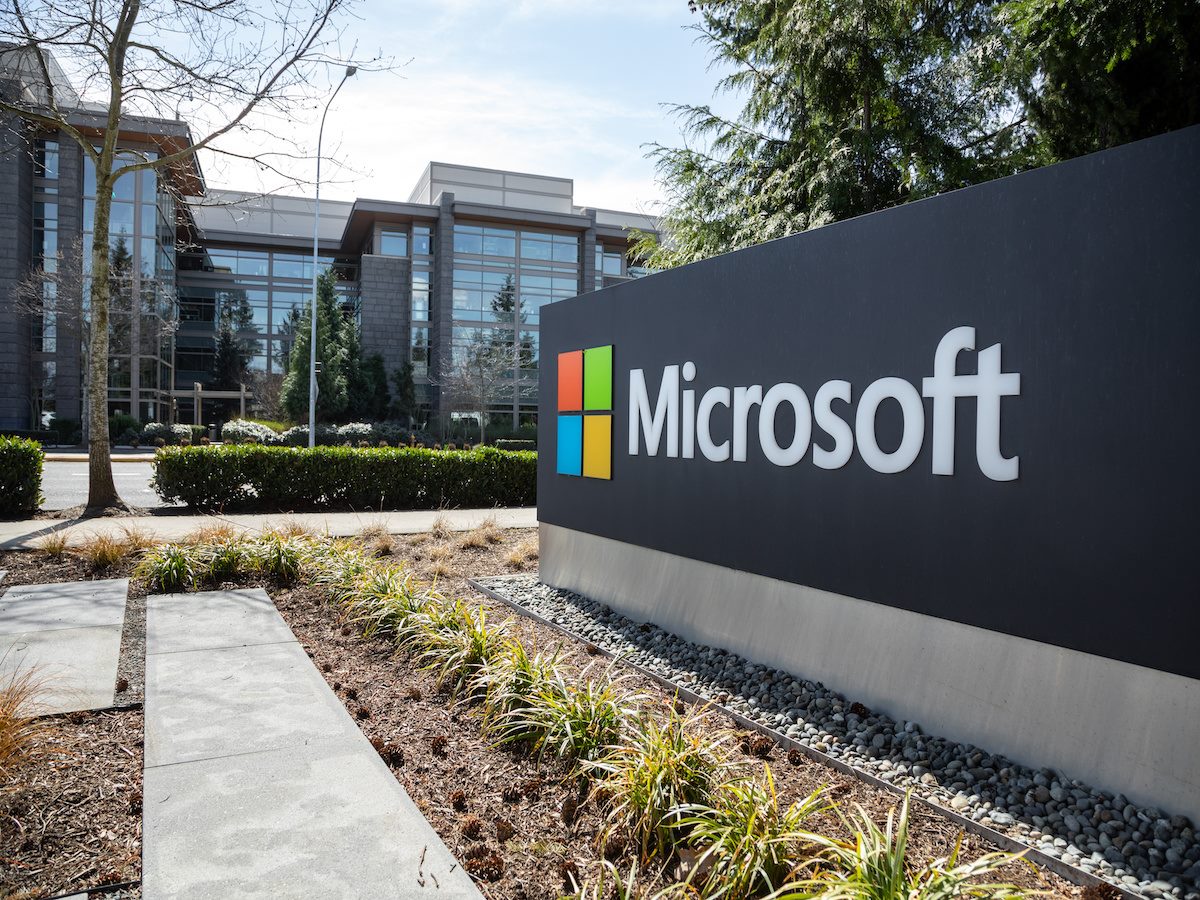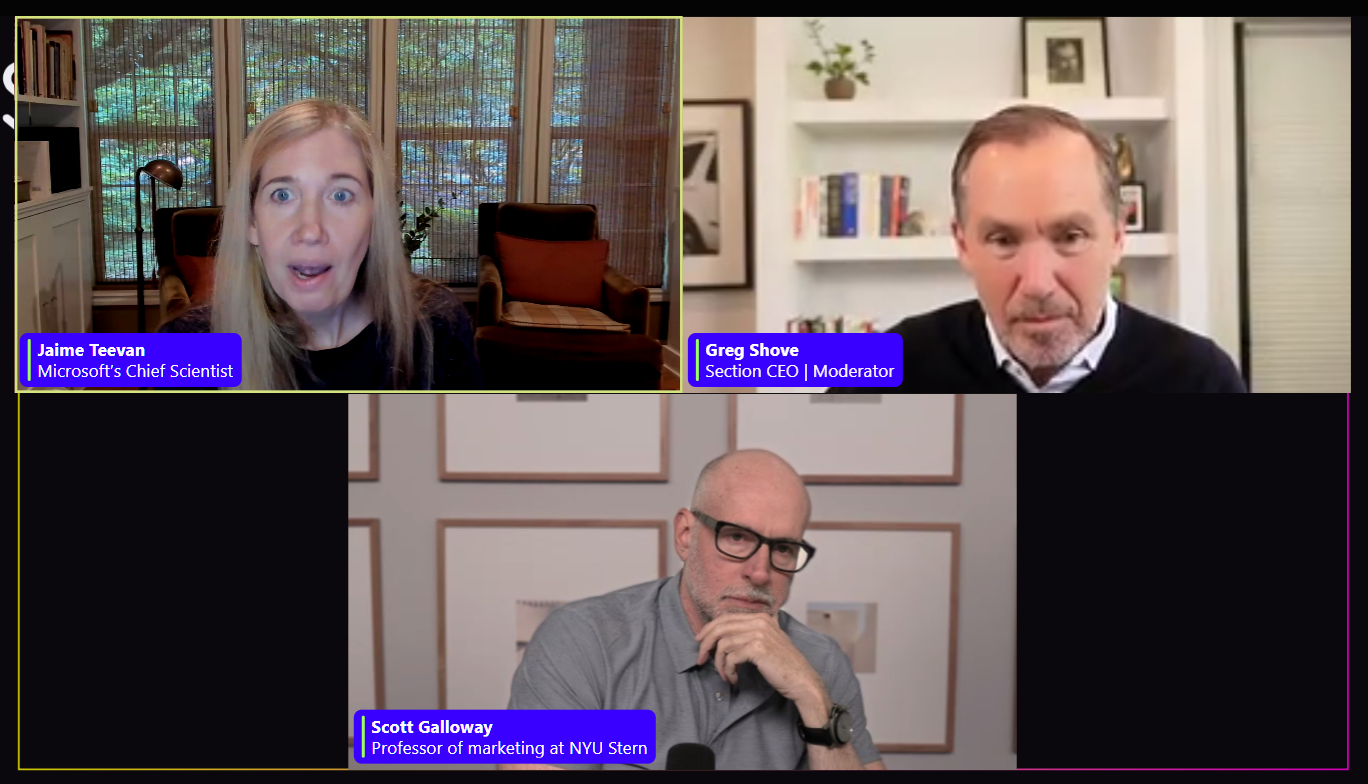Microsoft’s Chief Scientist, Jaime Teevan, joined NYU Professor and entrepreneur Scott Galloway on June 12, 2025, for a discussion on the the AI and the future of work.
Moderated by Section CEO Greg Shove, the conversation explored a question that’s weighing on minds everywhere: What will AI really mean for our jobs — and for us?
From the risk of being replaced to the challenge of staying sharp when machines take over the hard thinking, Teevan explored the implications of AI on knowledge work, productivity and the evolving human role. The conversation also includes a refreshingly grounded take on where we're headed next, mixed with a dose of hard truth and irreverent humor.
The Brains Steering Today’s Most Crucial AI Conversation
Jaime Teevan is chief scientist and technical fellow at Microsoft, where she leads research on productivity, hybrid work and the integration of AI into tools like Microsoft 365 Copilot. Her background includes work in personalized search, micro-productivity and collaboration technologies. Teevan brings both academic and product experience to the conversation, focusing on how AI can augment human capability rather than replace it.
Scott Galloway is a professor of marketing at NYU Stern School of Business, where he teaches brand strategy and digital marketing. He’s also the founder of multiple businesses, including L2 and Prophet, and is known for his blunt takes on tech, media and society. In this session, Galloway brings a pragmatic lens to the discussion, challenging assumptions about AI’s impact on productivity, layoffs and leadership accountability.
Greg Shove, CEO of Section and founder of software development consultancy Machine and Partners, also joined the session, moderating the conversation and guiding the discussion with thoughtful — and at times provocative — questions
The AI Job Threat Narrative — Overblown or Underestimated?
Among fears of mass displacement, a more nuanced picture is emerging — one in which AI transforms the nature of work rather than erases it. While headlines focus on automation and job cuts, experts like Jaime Teevan suggest that the deeper story is about how humans and machines reshape work together.
“The models have capabilities that we are not yet taking advantage of…," said Teevan. "If development stopped this second, we’d still have 50 years of work to figure things out.”
She emphasized that the real challenge isn’t AI replacing people — it’s the long-term task of integrating AI meaningfully into workflows, industries and institutions. She noted that even powerful tools such as Microsoft 365 Copilot are built to support how people already work, not replace them. In fact, she compared this period to the early days of electricity in factories — where the most profound changes took decades to fully realize.
While short-term job shifts are inevitable, the transformation is likely to be evolutionary, but not catastrophic. As Teevan explained, businesses will need time to adapt — and that adaptation involves reimagining not just individual roles, but how teams collaborate, how value is created and what human work means in an AI-assisted world. That said, Galloway included a slightly ominous note, joking, “I’ve got good news: our earnings are up. And I’ve got great news: I’m going to need fewer of you next quarter.”
Related Article: Shaping Future-Ready Workforces With AI
Redefining Knowledge Work in the AI Era
The rise of generative AI is reshaping not just what knowledge workers do, but how they do it. As automation takes over repetitive and executional tasks, the human role increasingly shifts toward judgment, oversight, synthesis and collaboration. That shift is redefining productivity — not as speed, but as the ability to reason, contextualize and integrate across complex systems.
“AI increases the metacognitive demand… It’s better to use it as a thought partner that challenges your thinking and helps express your intent.”
- Jaime Teevan
Chief Scientist and Technical Fellow, Microsoft
Teevan, who leads Microsoft’s Future of Work research, pointed out that modern AI tools don’t just reduce labor — they shift its nature. With tools like Microsoft 365 Copilot, the focus shifts from rote execution to higher-order thinking. Tasks that were once manual, such as generating a report or summarizing a meeting, are increasingly handled by AI, leaving humans to guide outcomes, assess accuracy and steer direction.
Her earlier work on micro-productivity laid the foundation for this transition, exploring how breaking down tasks into smaller cognitive units can improve focus and reduce friction. In the AI era, that insight becomes even more critical: instead of doing the work step-by-step, humans are now creating workflows, managing models and evaluating outcomes.
New skills are quickly becoming essential — prompt engineering, critical synthesis, strategic delegation and collaborative thinking. Teevan noted that success will depend not just on how well individuals can prompt a system, but on how well they can partner with it, especially in teams. As she put it, “The real opportunity is in how AI helps us collaborate better,” opening new dimensions of creativity and insight across group settings.
Will AI Make Us Dumber? Cognitive Fitness in the Age of Autopilot
"What it means to be human is foundational, and that is not changing."
- Jaime Teevan
Chief Scientist and Technical Fellow, Microsoft
As AI systems take on more cognitive tasks — writing emails, analyzing data even making strategic decisions — an uncomfortable question arises: Are we outsourcing too much of our thinking? Scott Galloway didn’t shy away from the concern.
“Are we worried about sort of cognitively offloading everything to AI?” Galloway asked. He voiced a broader cultural anxiety: that as we lean on AI to think for us, we risk losing our own edge. His worry is not just that AI might do too much — but that humans might stop doing enough, becoming passive in the process.
Teevan acknowledged the tension, but reframed it. Like the arrival of calculators or spellcheck, she said, new tools don’t eliminate the need for knowledge — they shift how we engage with it.
“You don’t need to learn handwriting, but you can do cooking… What it means to be human is foundational, and that is not changing,” said Teevan.
She emphasized that AI is already embedded in countless aspects of modern life — from medical diagnostics to autopilot systems — and that society has long adapted to technological assistance. What matters now is how we design environments that keep human judgment, estimation and critical thinking in the loop. As she put it, just like kids who grow up with calculators learn to estimate rather than memorize tables, knowledge workers must learn to evaluate AI outputs, not blindly accept them.
Maintaining sharpness in the AI era will depend on building skills such as hypothesis testing, cross-checking and challenging assumptions — what Teevan refers to as metacognitive work. As AI handles more execution, humans must rise to the role of reviewer, strategist and ethical gatekeeper.
What's the Human Role Going Forward?
As AI becomes embedded in day-to-day operations, the defining question isn't what will AI do — but what will humans still do best? For Teevan, the answer lies in qualities machines can’t replicate: empathy, judgment, imagination and the ability to navigate complex social dynamics.
She argued that the future of work isn't about replacing humans, but about restructuring workflows to make the most of what humans bring to the table. This means designing systems where AI handles mechanical execution and pattern recognition, freeing people to focus on connection, innovation and ethical reasoning.
Rather than thinking of AI as a competitor, Teevan urges businesses and leaders to see it as a collaborator: a tool that challenges ideas, helps articulate intent and enhances creative exploration. She described her own use of AI as a “thought partner,” one that helps her question assumptions and refine her goals.
This philosophy is now influencing how tools like Microsoft 365 Copilot are designed — not to deskill workers, but to elevate their capacity to think, lead and adapt. As Teevan put it, the most powerful role AI can play is not in doing the job for us — but in helping us do our jobs better, together.
Related Article: Generative AI Is Your Co-Pilot — Are You Ready to Take Off?
The Real Call to Action: Co-Creating Work 3.0 With Machines
If there’s one message that resonated throughout the conversation, it’s this: the future of work isn’t about humans versus machines — it’s about how we work better together. AI’s promise lies less in full automation and more in thoughtful augmentation. It’s not replacing people; it’s challenging us to evolve.
“How does AI enable us to work together better, have more interesting conversations and create a new world we want our children to grow up into?” asked Teevan.
The discussion made clear that the most valuable workers won’t be the ones who fear being replaced, but the ones who redefine their roles — thinking of AI as a collaborator, not a competitor. Whether it's rethinking how teams collaborate, learning to prompt with precision or using AI as a personal mentor, today’s knowledge workers are being asked to become more strategic, more human and more adaptable.
“This is the ultimate mentor — ask it the questions you can’t ask your manager,”
Audience questions throughout the session reflected this shift in thinking: from concern to curiosity, from defensiveness to opportunity. It’s not about holding on to the old way of working — it’s about learning how to thrive in the new one.
The call to action from this event was simple but profound: Don’t resist the change. Reimagine your place within it. The tools are here. The shift has begun. Now it’s up to each of us to decide what kind of partner we’ll be to the AI that’s reshaping the world — and to the people navigating it alongside us.
Want to watch the full discussion? Check out the video below.

